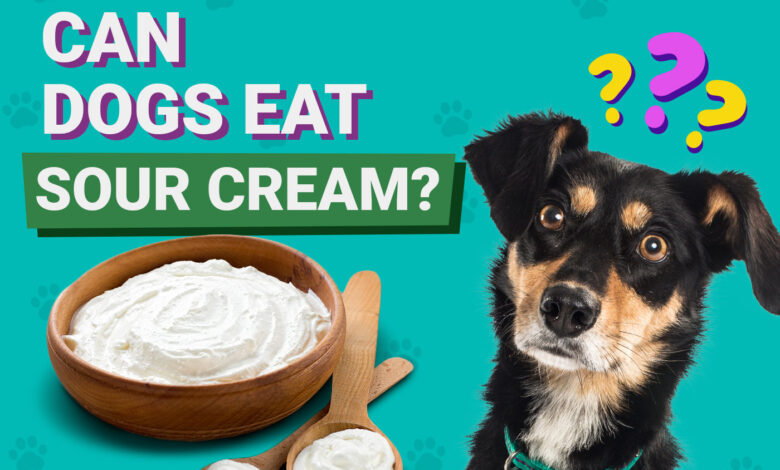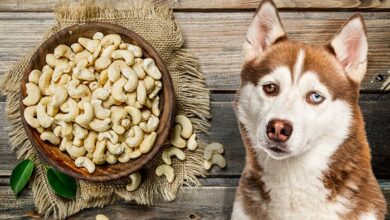Can Dogs Eat Sour Cream? Understanding the Effects on Dogs-2024

Can Dogs Eat Sour Cream? Sour cream isn’t toxic to dogs, but it can lead to digestive upset. Some dogs might handle small amounts without issue, but it’s not a good idea to feed it regularly.
Lactose intolerance and the high-fat content make sour cream a risky choice for most dogs. It’s best to opt for treats specifically made for dogs to ensure their diet supports their health.So, let’s explore together that- can dogs eat sour cream?
Why Some Dogs Struggle with Dairy Products
Can Dogs Eat Sour Cream? When considering if dogs can eat sour cream, it’s important to understand why some dogs struggle with dairy products. Many dogs have difficulty digesting dairy due to their body’s inability to process lactose effectively. Here’s a closer look at why dairy, including sour cream, might not be suitable for all dogs.
Lactose Digestion Challenges
- Lack of Lactase Enzyme: Many adult dogs lack sufficient levels of lactase, the enzyme needed to break down lactose, the sugar found in dairy. Without enough lactase, dairy products like sour cream can be difficult for them to digest properly.
- Digestive Issues: Because of this enzyme deficiency, dogs often experience digestive upset when consuming dairy. This can result in discomfort and gastrointestinal problems.
Common Reactions to Dairy
- Gas and Bloating: Dairy products can lead to excess gas and bloating in sensitive dogs. If your dog seems uncomfortable or bloated after eating sour cream, it might be reacting to the lactose content.
- Diarrhea: Another common reaction is diarrhea. Dogs with lactose intolerance may have loose stools or diarrhea shortly after consuming dairy products like sour cream.
High-Fat Concerns
- Weight Gain: Sour cream, like many dairy products, is high in fat. Regular consumption of fatty foods can contribute to weight gain in dogs, which can lead to obesity and related health issues.
- Risk of Pancreatitis: High-fat foods can also increase the risk of pancreatitis, a painful condition that causes inflammation of the pancreas. This can be particularly concerning if sour cream is a regular part of your dog’s diet.
When asking “Can dogs eat sour cream?” It’s essential to consider why some dogs struggle with dairy products. Many dogs have difficulty digesting lactose due to a lack of the necessary enzyme, which can lead to gas, bloating, and diarrhea. Additionally, the high fat content in sour cream can contribute to weight gain and increase the risk of pancreatitis. Can Dogs Eat Sour Cream ? Understanding these factors can help you make better dietary choices for your dog and avoid potential health issues.

Signs Your Dog Might Be Lactose Intolerant-Can Dogs Eat Sour Cream
When asking, “Can dogs eat sour cream?” It’s important to be aware of the signs that your dog might be lactose intolerant. Many dogs struggle with dairy products due to lactose intolerance, which can lead to various digestive issues. Here’s how to identify if your dog might be having trouble with lactose.
Common Symptoms of Lactose Intolerance
- Gas and Bloating: After eating dairy products like sour cream, dogs with lactose intolerance may experience excessive gas and bloating. These symptoms occur because their digestive system cannot properly break down lactose.
- Diarrhea: Diarrhea is another common sign of lactose intolerance. If your dog has loose stools or frequent bathroom trips after consuming dairy, it could be reacting poorly to the lactose content.
More Severe Reactions
- Vomiting: In some cases, lactose intolerance can lead to vomiting. This is a more severe reaction and indicates that your dog’s digestive system is struggling to process the dairy.
- Lethargy and Discomfort: If your dog seems unusually tired, lethargic, or uncomfortable after eating sour cream, it could be a sign of lactose intolerance. These symptoms can suggest that your dog is feeling unwell due to digestive upset.
Age and Lactose Intolerance
- Increased Likelihood with Age: Most dogs become lactose intolerant as they get older. Puppies are born with the ability to digest lactose, but this enzyme level often decreases as they mature. This means that even if your dog handled dairy well as a puppy, they might develop lactose intolerance as they age.
When considering if “Can dogs eat sour cream?” It’s crucial to recognize the signs of lactose intolerance. Symptoms like gas, diarrhea, and bloating are common, while vomiting and lethargy may occur in more severe cases. Remember that lactose intolerance often develops as dogs grow older, so even if your dog was fine with dairy in the past, they might struggle with it now.
Nutritional Impact of Sour Cream on Dogs
Can Dogs Eat Sour Cream? When considering if dogs can eat sour cream, it’s important to evaluate its nutritional impact on their health. While sour cream does offer some nutritional benefits, these are overshadowed by its potential drawbacks for dogs. Can Dogs Eat Sour Cream? Here’s a closer look at what sour cream provides and why it might not be the best choice for your dog.
Nutritional Benefits of Sour Cream
- Calcium and Protein: Sour cream contains calcium and protein, which are beneficial nutrients for dogs. Calcium supports bone health, while protein is essential for muscle maintenance and overall bodily functions.
- Moderate Nutrient Value: Although sour cream does offer some nutritional value, the benefits need to be weighed against the potential downsides.
High Fat and Calorie Content
- High in Fats: Sour cream is high in fat, which can lead to weight gain if consumed in large amounts. Excessive fat intake can contribute to obesity and associated health problems.
- Caloric Density: The high calorie content in sour cream means that it can quickly add up, disrupting a dog’s balanced diet and potentially leading to weight-related issues.
Digestive Issues vs. Nutritional Benefits
- Digestive Discomfort: The risk of digestive issues, such as gas, bloating, and diarrhea, often outweighs the nutritional benefits of sour cream. Many dogs have trouble digesting dairy, making the risks of feeding sour cream significant.
- Healthier Alternatives: There are better sources of calcium and protein for dogs. Options like plain yogurt or low-fat cottage cheese provide similar benefits without the high fat and calorie content. These alternatives are often easier on a dog’s digestive system and can be safer choices.
When asking “Can dogs eat sour cream?” consider the nutritional impact. While sour cream provides some calcium and protein, its high fat and calorie content, along with potential digestive issues, make it less ideal for dogs. Can Dogs Eat Sour Cream? Healthier alternatives like plain yogurt or cottage cheese offer similar benefits without the drawbacks, making them better choices for your dog’s diet.
Healthier Dairy-Free Alternatives for Dogs
When considering if “Can dogs eat sour cream?” it’s essential to explore healthier, dairy-free alternatives for dogs. Sour cream’s high fat and lactose content can lead to digestive issues and may not be the best choice for your pet. Fortunately, there are several nutritious options that can provide treats and supplements to your dog’s diet without the drawbacks of dairy. Here’s a look at some great dairy-free alternatives for dogs.
Plain, Low-Fat Yogurt
- Probiotics Benefit: Plain, low-fat yogurt with probiotics is a safer alternative for dogs that can tolerate dairy. Probiotics help maintain healthy gut flora, which can support digestion and overall health.
- Moderation is Key: While yogurt can be a good option, it’s important to serve it in moderation and ensure that your dog does not have any lactose intolerance issues.
Dog-Safe Fruits and Vegetables
- Pumpkin: Plain, cooked pumpkin is an excellent low-calorie treat that is gentle on a dog’s digestive system. It’s high in fiber and can aid in digestive health.
- Carrots: Carrots are a crunchy, nutritious treat that provides vitamins and fiber. They are low in calories and can be a great addition to your dog’s diet.
- Other Options: Green beans, apples (without seeds), and blueberries are also good choices for healthy, low-calorie snacks.
Dog-Friendly Treats
- Specially Formulated Treats: Dog-friendly treats are specifically designed to be easy on a dog’s digestive system. They often avoid harmful ingredients and are formulated to meet canine nutritional needs.
- Variety of Flavors: Look for treats that offer a range of flavors and textures to keep your dog engaged while ensuring they get a healthy snack.
When asking “Can dogs eat sour cream?” It’s helpful to consider dairy-free alternatives that can benefit your dog’s health without the risks associated with high fat and lactose. Plain, low-fat yogurt with probiotics can be a safe option for some dogs, while dog-safe fruits and vegetables like pumpkin and carrots offer nutritious, low-calorie treats. Additionally, Can Dogs Eat Sour Cream ? choosing specially formulated dog treats can ensure that your pet receives healthy, digestive-friendly snacks.
What to Do If Your Dog Consumes Sour Cream
If your dog consumes sour cream, it’s important to monitor their health and take the appropriate steps to ensure their well-being. Sour cream, while not toxic, can lead to digestive issues, especially if your dog is not accustomed to dairy or has a sensitive stomach.
Monitor for Digestive Discomfort
- Watch for Symptoms: Keep an eye out for signs such as vomiting, diarrhea, or excessive gas. These symptoms can indicate that your dog is having trouble digesting the sour cream.
Ensure Hydration
- Maintain Hydration: Make sure your dog has access to fresh water. Staying hydrated is crucial, especially if your dog is experiencing digestive upset, as diarrhea can lead to dehydration.
Contact a Vet If Needed
- Seek Veterinary Advice: If your dog’s symptoms persist or worsen, contact your veterinarian. Persistent issues could indicate more serious problems, and your vet can provide guidance on how to manage your dog’s condition.
Can Dogs Eat Sour Cream? Taking these steps will help you address any immediate concerns and ensure that your dog remains comfortable after consuming sour cream.




